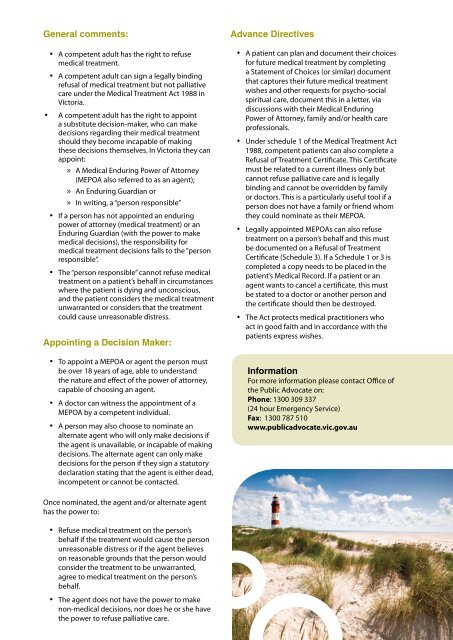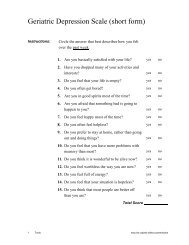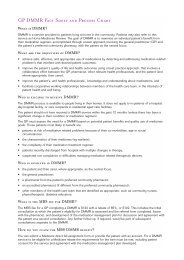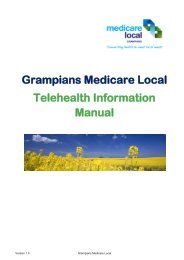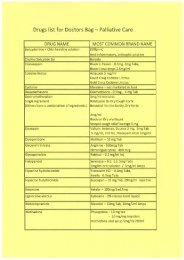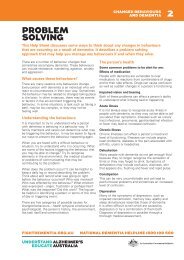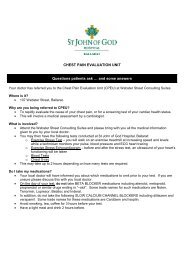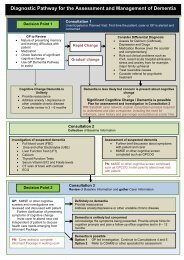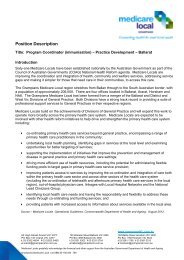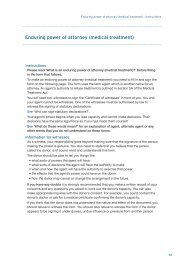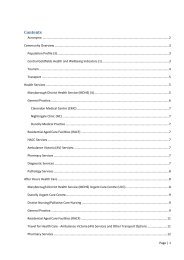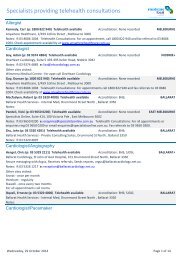Doctor's Bag: Palliative Care Information booklet - Grampians ...
Doctor's Bag: Palliative Care Information booklet - Grampians ...
Doctor's Bag: Palliative Care Information booklet - Grampians ...
Create successful ePaper yourself
Turn your PDF publications into a flip-book with our unique Google optimized e-Paper software.
General comments:<br />
• A competent adult has the right to refuse<br />
medical treatment.<br />
• A competent adult can sign a legally binding<br />
refusal of medical treatment but not palliative<br />
care under the Medical Treatment Act 1988 in<br />
Victoria.<br />
• A competent adult has the right to appoint<br />
a substitute decision-maker, who can make<br />
decisions regarding their medical treatment<br />
should they become incapable of making<br />
these decisions themselves. In Victoria they can<br />
appoint:<br />
»» A Medical Enduring Power of Attorney<br />
(MEPOA also referred to as an agent);<br />
»» An Enduring Guardian or <br />
»» In writing, a “person responsible”<br />
• If a person has not appointed an enduring<br />
power of attorney (medical treatment) or an<br />
Enduring Guardian (with the power to make<br />
medical decisions), the responsibility for<br />
medical treatment decisions falls to the “person<br />
responsible”.<br />
• The “person responsible” cannot refuse medical<br />
treatment on a patient’s behalf in circumstances<br />
where the patient is dying and unconscious,<br />
and the patient considers the medical treatment<br />
unwarranted or considers that the treatment<br />
could cause unreasonable distress.<br />
Appointing a Decision Maker:<br />
• To appoint a MEPOA or agent the person must<br />
be over 18 years of age, able to understand<br />
the nature and effect of the power of attorney,<br />
capable of choosing an agent.<br />
• A doctor can witness the appointment of a<br />
MEPOA by a competent individual.<br />
• A person may also choose to nominate an<br />
alternate agent who will only make decisions if<br />
the agent is unavailable, or incapable of making<br />
decisions. The alternate agent can only make<br />
decisions for the person if they sign a statutory<br />
declaration stating that the agent is either dead,<br />
incompetent or cannot be contacted.<br />
Advance Directives<br />
• A patient can plan and document their choices<br />
for future medical treatment by completing<br />
a Statement of Choices (or similar) document<br />
that captures their future medical treatment<br />
wishes and other requests for psycho-social<br />
spiritual care, document this in a letter, via<br />
discussions with their Medical Enduring<br />
Power of Attorney, family and/or health care<br />
professionals.<br />
• Under schedule 1 of the Medical Treatment Act<br />
1988, competent patients can also complete a<br />
Refusal of Treatment Certificate. This Certificate<br />
must be related to a current illness only but<br />
cannot refuse palliative care and is legally<br />
binding and cannot be overridden by family<br />
or doctors. This is a particularly useful tool if a<br />
person does not have a family or friend whom<br />
they could nominate as their MEPOA.<br />
• Legally appointed MEPOAs can also refuse<br />
treatment on a person’s behalf and this must<br />
be documented on a Refusal of Treatment<br />
Certificate (Schedule 3). If a Schedule 1 or 3 is<br />
completed a copy needs to be placed in the<br />
patient’s Medical Record. If a patient or an<br />
agent wants to cancel a certificate, this must<br />
be stated to a doctor or another person and<br />
the certificate should then be destroyed.<br />
• The Act protects medical practitioners who<br />
act in good faith and in accordance with the<br />
patients express wishes.<br />
<strong>Information</strong><br />
For more information please contact Office of<br />
the Public Advocate on:<br />
Phone: 1300 309 337<br />
(24 hour Emergency Service)<br />
Fax: 1300 787 510<br />
www.publicadvocate.vic.gov.au<br />
Once nominated, the agent and/or alternate agent<br />
has the power to:<br />
• Refuse medical treatment on the person’s<br />
behalf if the treatment would cause the person<br />
unreasonable distress or if the agent believes<br />
on reasonable grounds that the person would<br />
consider the treatment to be unwarranted,<br />
agree to medical treatment on the person’s<br />
behalf.<br />
• The agent does not have the power to make<br />
non-medical decisions, nor does he or she have<br />
the power to refuse palliative care.


